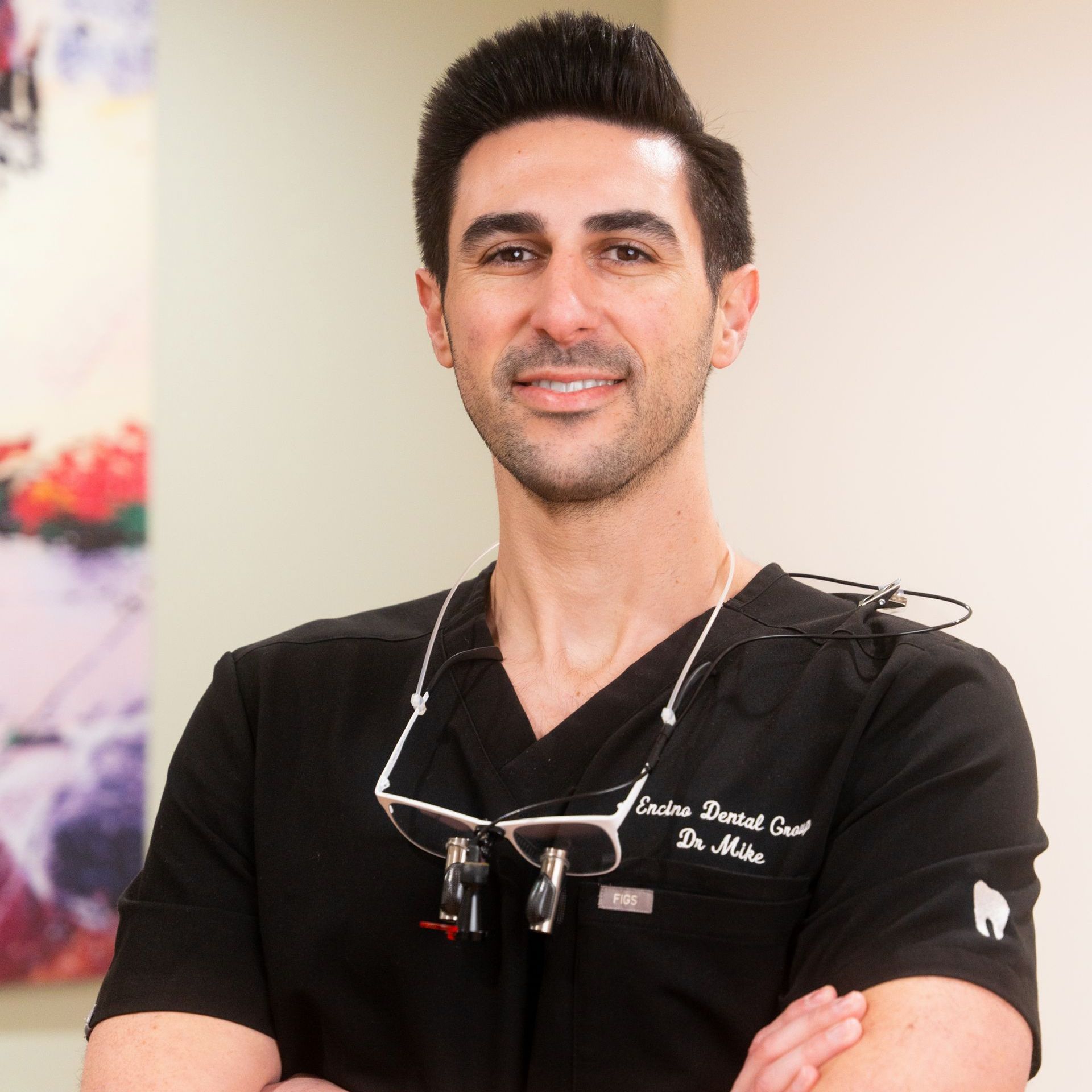Bruxism Treatment
Encino Dental Practice is a comprehensive dental practice that provides care for all of your dental needs. Our dentist, Dr. Mamaliger, can help if you are struggling with bruxism. This is also known as teeth clenching or grinding. We are located in Encino, CA, and offer the latest treatment options for bruxism. This page provides detailed information on bruxism. It includes its causes, symptoms, and treatment options.
Understanding Bruxism
Bruxism, also known as teeth grinding or clenching, is a condition that occurs involuntarily. It can occur during sleep and even during waking hours. If left untreated, this condition can cause a variety of dental and health problems.
Bruxism Types
There are two types of bruxism.
- Sleep Bruxism: This is a condition that occurs while sleeping and can be associated with other sleep disorders, such as sleep apnea. Sleep bruxism can be a silent condition. People may not even realize they are grinding teeth.
- Awake Bractism: This is a condition that occurs when you are awake and can be linked to anxiety, stress, or concentration. Some people clench without even realizing it. This is especially true during intense concentration or emotional stress.
Causes of Bruxism
The cause of bruxism may not be known, but several factors can lead to this condition:
- Stress and Anxiety: High levels of stress and anxiety contribute to sleep disorders and bruxism.
- Sleep Disorders: Sleep disorders such as sleep apnea and other sleep-related issues can increase your chances of grinding teeth during sleep.
- Substances and Medications: Some substances, such as caffeine and alcohol, can worsen bruxism.
- Lifestyle Factors: Smoking and excessive alcohol consumption can increase your risk of bruxism.
- Dental Issues: An abnormal bite and misaligned teeth can cause bruxism.
We Have New Pantient Specials for You!
Early Intervention is Important
Early intervention is essential to prevent the long-term consequences of bruxism. You can reduce your pain and improve your quality of life by addressing this condition as soon as possible.
Avoiding Tooth Damage
Early intervention is aimed at preventing significant damage to teeth. Custom-fitted, custom-made mouthguards protect teeth from the damaging effects of grinding and clenching, reducing fractures, wear, and sensitivity.
Reduce Pain and Discomfort
Early treatment of bruxism can relieve the pain and discomfort caused by jaw tension, headaches, and earaches. This will improve your comfort level and help prevent chronic pain.
Improve Sleep Quality
By addressing bruxism, you can improve your sleep by reducing the sleep disturbances that are caused by grinding or clenching. A night of better sleep can improve your health and well-being.
Enhancing Overall Wellness
You can lower your risk of chronic pain and TMD by managing bruxism. It can improve your health and overall quality of life.
Treatment Options for Bruxism
Dr. Mamaliger provides a variety of treatment options at Encino Dental Practice to help manage and relieve the symptoms of bruxism. Our goal is for you to have a better quality of life, protect your teeth, and reduce your discomfort.
Dental Approaches
- Splints and Mouthguards: Custom-fitted mouthguards or custom-fitted splints may be worn to reduce jaw tension and protect teeth against grinding.
- Dental Corrections: Correcting misaligned or abnormally shaped teeth through orthodontic treatment or restorative procedures may help reduce bruxism.
- Botox: Botox injections are sometimes used to relax jaw muscles and reduce grinding.
Behavioral Approaches
- Stress Management: Techniques like relaxation exercises, meditation, and therapy can help reduce stress and bruxism.
- Sleep Hygiene: Improving sleeping habits and treating sleep disorders will help reduce sleep bruxism. It may be necessary to create a relaxing bedtime routine, ensure a comfortable sleeping environment, or seek treatment for sleep apnea.
- Behavior Modification and Awareness: It is beneficial to learn how to identify and modify the behaviors associated with awakened bruxism. For example, consciously relaxing your jaw muscles.
Medication
Some medications may be prescribed for the treatment of bruxism. It could be muscle relaxants that reduce jaw tension or medications to treat underlying conditions such as anxiety or sleep disorders.
Make Your Appointment
Save your tooth with us
Make Your Appointment
Save your tooth with us!
Frequently Asked Questions
What is Bruxism, and What Causes It?
Stress, anxiety, sleep problems, medications, lifestyle decisions, and dental issues can all cause bruxism. It is important to identify the cause of bruxism in order to get effective treatment.
How is Bruxism Detected?
Bruxism can be diagnosed by combining a patient's history with a clinical examination and diagnostic tools like X-rays, sleep studies, or other tests. Dr. Mamaliger evaluates your symptoms to determine the diagnosis.
Can Bruxism be Cured?
There is no cure for bruxism. However, it can be managed effectively with a combination dental, behavioral and medical approaches. The treatment focuses on reducing symptoms and preventing complications.
How Long Will It Take Me to See Improvements After Treatment?
The timeframe for improvement depends on the severity and treatment of the condition. Some patients will see improvements within a couple of weeks while others may need more time. It is important to adhere to the treatment plan.
Can Children Have Bruxism?
Children can experience bruxism. You should monitor your child's symptoms and, if needed, seek treatment. Untreated bruxism may affect their dental health and development.
Encino Dental Group
Book Your Dental Visit Today!
818-293-4485
818-572-9927
Business Hours
- Mon - Tue
- -
- Wednesday
- -
- Thursday
- -
- Fri - Sat
- Appointment Only
- Sunday
- Closed


